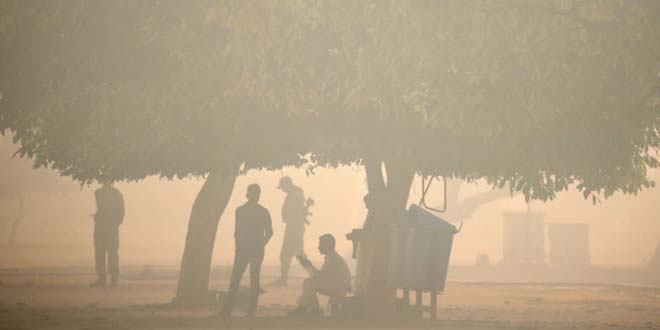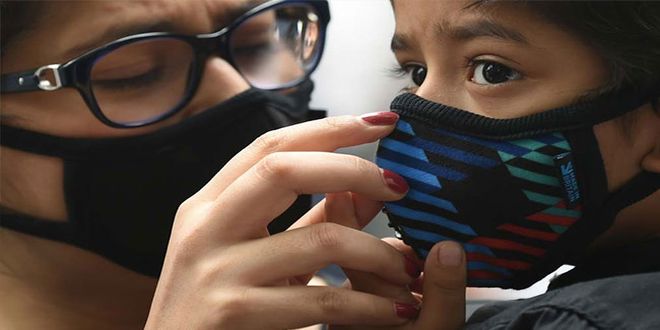Highlights
- Breathing Delhi’s air for a day is equal to smoking 50 cigarettes:Dr Arvind
- Exposure to high level of pollution can affect life span: Experts
- Newborns are beginning their lives virtually as smokers: Experts
New Delhi: As Delhi-NCR chokes under thick blanket of smog, and health experts declare it as a health emergency, government takes several steps to reduce the level of air pollution. From imposing a ban on civil construction in Delhi-NCR to putting a ban on the entry of trucks with exceptions, from closing schools to mulling over bringing back odd-even, but these short term measures are yet to make a long term dent on the problem.
Hospitals see a spike in cases where people residing in Delhi-NCR complain of respiratory and cardiac problems, irritation in eyes, and low level of visibility. The question that arises is, are these emergency measures enough? How is PM2.5 so bad? What are the harmful effects of the plunging Air Quality Index (AQI)? NDTV speak to some of the health experts and here is what they have to say:
Also Read: 7 Steps Taken By Authorities To Curb Rising Air Pollution Levels In Delhi
Randeep Guleria, Director of AIIMS talks about the problems faced by healthy people and how vital it is to stop the blame game and find a sustainable solution.
Current level of air pollution is going to have major short term and long term health effects. Even healthy people are feeling irritation in their eyes, they are having breathing difficulty. Some are complaining of congestion in their chest and dry cough. Think of what will happen to the elderly, the children and those with cardiovascular problem, says Dr Guleria.
Talking about the consequences of current level of pollution, Dr Guleria says,
If this high level of air pollution continues for few days, it is going to have an acute effect with increase in number of people coming to the emergency with respiratory difficulty. There is around 20-25% increase in the number of individuals who come in the subsequent 48 hours of the high levels of pollution in emergency and into the OPD.
Dr Randeep Guleria also urges people to come together and find a sustainable solution. Currently, authorities are playing a blame game and this is only worsening the situation. He says,
We have a problem and we need to find a solution. There is no point in blaming one or the other. I think the time has come that all of us, i.e, policy makers, physicians, environmentalists, even common citizens, sit together and come up with a sustainable long-term solution. The solutions that we are looking for at times are just short term. This happens every year. Last year also we were in a similar situation and all these issues came then also. This is going to happen year after year unless we all sit together, stop blaming each other, and say yes, we have a problem. This is not only for Delhi, it is for entire North India and we need to work together.
Watch: North India’s Health Emergency: AIIMS Director Speaks To NDTV
On the other hand, Dr Arvind Kumar, Chest surgeon, Sir Ganga Ram Hospital (SGRH) tells how breathing Delhi’s air for a day is equivalent to smoking 50 cigarettes. Echoing what Dr Randeep Guleria said, he also urges everyone to sit together and come out with a concrete solution as this is not a one-time problem; Delhi faces this every year and will continue to face in the coming years. He said,
We all are shortening our lives by several days. PM 2.5 of 20 micrograms is equal to 1 cigarette which means PM2.5 of 999 is equivalent to 50 cigarettes. Tell me if you have your child going to school and he is breathing 50 cigarettes there, would you let this happen? Do we want people to choke and fall dead on the roads? That’s when we will wake up? questions Dr Arvind.
Dr Arvind requests parents to not send their children out before 10 in the morning as PM2.5 is at 900+. He says, “Children are the future of the country and we are damaging it. Please don’t have children of Delhi come out on the roads before 10 O’clock. It is very unhealthy and almost criminal towards those children and their parents.”
Dr Arvind also urged politicians to not play the blame game and come up with a long term plan. He says,
Last year, just after Diwali, for 10 days the city was facing the same situation that we are facing today. What is lacking is the political will. You are dealing with the health of 1200 million people of this country. 2.5 billion lungs of this country, hearts, brain, the entire lives are at stake. It is not a matter in which politics should be played. We should sit together and workout long term plan.
Also Read: Battling Delhi’s Killer Smog: Odd-Even 3.0 Returns From November 13, But Will It Be A Success?
Health experts also say that newborns are beginning their lives virtually as smokers. Pediatrician at the SGRH Dr Anil Sachdeva supports this and says,
Newborn have virgin lungs. And, naturally, they are at a very high risk of contracting breath related ailments in environmental condition, such as the one prevailing now. They could contract bronchitis and persistent nasal discharge, have problem in breathing due to blockage of wind passage, and also in feeding.
While Dr Randeep Guleria and Dr Arvind Kumar talk about the problems faced by people and what we need to do, meanwhile, EPCA Chief Bhure Lal gives reason for the sudden upsurge in the levels of pollution. He says,
The sudden surge that you see in the levels of pollution is because of natural reasons which are not under our control. We cannot control wind velocity and wind direction. Westerly winds coming from Punjab side were carrying pollution and easterly winds from Uttar Pradesh side were carrying moisture. Intermixing of these two different winds created this situation. Emergency measures have been taken to combat the problem.
Air pollution levels in Delhi are so high that the levels of carcinogenic gases in air is about 10 times higher than the limits prescribed by the World Health Organisation (WHO). Delhi needs to wake up and fight with air pollution more holistically.
Also Read: A Tale Of Two Capitals: Delhi And Beijing’s Fight To Curb Air Pollution

































